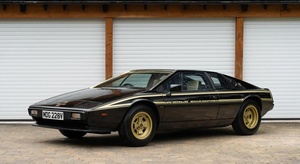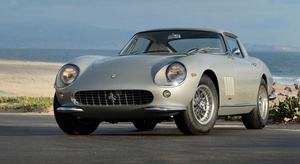
Let's go shopping with someone else's money: Would you buy a historically important race car, or would you rather have a street car?
The reason we ask: Of RM Sotheby’s 14 lots available after this weekend’s Monterey sales, 10 are race cars. That list includes some very choice m…
Read the rest of the story

Tom1200
SuperDork
8/16/21 1:40 p.m.
I recently told a student at a PCA event that I will never own a really nice / cool street car because I will always choose an old race car over a street car.
Given my proclivities, I'd want something I could drive on the street; I can't seem to get lined up to hit all the auto-x's I'd like to get to, never mind a track, which means I'd never drive it.
But, I've no budget to collect anything, so there's that, too.
Anymore to really have fun in a street car, I would need to drive it in a manner that would wind me up in jail.
The real question is what is the least suck you can find in a tow vehicle so you can take your toys to the track?
I'd prefer an historically insignificant old race car. I don't mind driving expensive race cars but I get nervous driving something with a provenance that makes it irreplaceable. I think I'd still feel that way even if it was my car.

Driven5
UltraDork
8/16/21 2:17 p.m.
I couldn't give a historically significant race car the life it deserves, so I'd go with the street car. If ever I had the time share it with the world, and could afford to eat all of the costs (and risks) associated with doing so, then I might go with the race car instead.
Old Yeller II was at the vintage races this year. Getting up close and personal with a car that had been driven by multiple of the all-time greats in American motorsports history, and then watching it on the track, was really something special.
APEowner said:
I'd prefer an historically insignificant old race car. I don't mind driving expensive race cars but I get nervous driving something with a provenance that makes it irreplaceable. I think I'd still feel that way even if it was my car.
My feelings exactly. If it's historically significant, you have to treat it as if it's not really yours. You're just the caretaker. Better an interesting car that is not significant to anyone else.
Unless you want to run in the Mille Miglia or something like the Le Mans Classic. In which case it HAS to be historically significant to get invited :)

In reply to Keith Tanner :
Not all old race cars are famous. My Black Jack Spl achieved more fame under my ownership than the guy who built it originally in 1958. ( Jack Baker ) he won one regional championship and finished 2nd in Road America 500 ( thanks to a 50 gallon gas tank )
There are plenty of also rans, grid fillers, and DNF's. That can be purchased for modest money and yet will give their owner a lifetime of memories and stories. Is there anything cheaper than a worn out obsolete race car? Sometimes not even so worn out!!! A typical vintage race weekend is generally less than 200 miles. 3-4-5 events a year over the 10 year lifetime = 10,000 or less!!!
Some cars retain value because of what they are. Aston Martin for example. You won't find a low dollar one even in poor shape. Similar performance can be had with a Jaguar that might sell cheaper than an emblem would for the Aston Martin. Just like you can put a Big engine into the cooking version of a "muscle car" for a lot cheaper than an original car sells for.
Perhaps my example of a Jaguar isn't so good. OK; an XKE or a XK 120 Roadster are up in nosebleed territory now but they were once $300 junkers with just a little rust on the rocker panels not that long ago.
But there are plenty of old race cars with modest histories or just old cars that can be made as tribute cars.
The question specified "historically significant". APEowner and I both said we'd prefer historically insignificant cars, aka your grid fillers. Basically, same thing you said.
I'm not sure I'd call an obsolete worn out race car cheap if you want to keep racing it, though...
I raced for a number of years. I really don't want to deal with trailers and tow vehicles and all that ever again. Not unless I had a huge windfall and could afford quality vehicles and the space to keep them.
The next "toy" will be a streetable track car.
In reply to Keith Tanner :
Vintage racing differs from other racing in that a fair number of "Gentlemen" would hire me to prepare their cars and that paid for my race preparation. Then someone would cover the costs of transportation if I'd bring his car along with mine. Once at the track my entry was paid by me serving as his crew chief.
Speed weeks in the Bahamas cost me $300 out of pocket and much of that was spent by my wife. Same with San Diego North Island. Watkins Glen, Mid Ohio, Road America, Road Atlantic,
Some of those were one time only while others were regular events. My next events will be with team mates. Who in exchange for race time will help me prepare the car.
Racing doesn't have to be expensive.
In reply to frenchyd :
Racing is definitely cheaper if you can find someone else to pay your bills :)

Tom1200
SuperDork
8/16/21 5:38 p.m.
In reply to Keith Tanner :
I have driven a historically significant car on track; the owner asked me to not hold back with it, so I didn't. I don't wish to crash any race car, regardless of value or significance. Any reasonable competent club racer can drive a car on the limit, without going off track. Vintage racing is such that one should not be trying any Hail Mary last lap "I want to win the RunOffs" maneuvers in a any vintage race car.
I'd have no problem flogging a historically significant car any more than the two race cars I own now. It costs no more money to repair a converted street E30 M3 than it does one with provenance.
As for the caretaker aspect I've never bought into that. I would keep the car period correct, the vintage experience is about driving the car how it was back in the day. I am fine with minor concessions for the sake reliability, as long as they do not change the outward appearance or alter the performance.

Of course it's possible to circulate near the limit without going off track. I do it all the time. But of course you're not necessarily surrounded by the same mindset. Vintage racing in Europe in particular is a lot more cutthroat in the US.
But if the car is historically significant, a big part of its value is that provenance. And your minor concessions may be acceptable to you, but will they be acceptable to a future owner? This is why a lot of vintage race Bugattis have their real engine in a crate while they race with a Pur Sang engine, of course. And it sure does cost more to repair a car with provenance than it does a random street car - you have to use the correct parts and try to duplicate the previous appearance as much as possible. When you've just wiped the surviving livery from a historic DTM race win off the side of a race car, it's going to cost a bunch more to sort out than a red street car and you now have a car that's one step closer to a replica than the real thing. That said, provenance is a tenuous and mysterious thing. Sometimes, as long as the VIN survives, there is no effect on the value. Sometimes there is.
You can have the vintage race experience without the potential downsides of having to manage historical significance. I would only pay the premium for a historically significant car if 1) there is no other version of that car or 2) I was looking for an investment vehicle.
This is not a theoretical exercise. A unicorn I've been stalking for years has surfaced and is available, and I can pay cash money for it today if I want it. But I've come to realize that the provenance and history is potentially more interesting than the car itself in some ways. I could make the car better but only at the expense of sidestepping some of its original build parameters. I have decided it's not going to join my garage.

Tom1200
SuperDork
8/16/21 6:24 p.m.
In reply to Keith Tanner :
We are in agreement for the most part; when I say minor concessions I'm taking about things that can easily be undone. Your example of Bugatti engines, while not really minor, is a good one..............you can always put the proper engine back in before you sell it if need be.
As for the famous livery it costs no more than any other nicely done paint job and custom made fancy decals. There are guys at vintage club races with 10K paint jobs on their zero provenance TR4s, 510s & 2002s now.
I'm well aware of European vintage racing being way more cut throat; I know some guys vintage racing on both sides of the Atlantic and we have conversations about this from time to time.
As for your unicorn; if driving it and owning it doesn't float your boat then I'd say why bother. Niki Lauda and Jochen Rindt both raced Formula Vee but if you don't like Formula Vees then it's not going to mean much to have one of their cars.
If I had to pick a dream vintage race car for me it would be a Lotus 23B; If Jim Clark once drove it that would be cool but I wouldn't treat it any different than one he hadn't.

It might not cost that much to repaint the famous livery - but you're not bringing it back, you're copying it. That's where the tenuous aspect of provenance comes in. It's like cleaning a car that raced at Le Mans (or was found in a barn). That specific patina cannot be replaced. It would be like wrecking a body panel that had been pinstriped by Van Dutch. Sure, you can recreate it. But you can't replace it. Is a 23 worth less if the hand-hammered fenders are reproductions instead of the ones that Jim Clark raced with? To some people, maybe. Probably.
Like I said, provenance is a weird thing. You have no real respect for it (and I'm with you on that) but I'm making the assumption that you paid for it when you obtained the historically significant car. You might not treat a 23 any different if Jim Clark won a race at the Nurburging in it, but you sure will pay a lot more for it. So why pay when you can get the same experience in a less significant car and not have to be as concerned about your modifications being reversible?
Owning my unicorn may very well float my boat, but I'm not willing to pay the extra for its provenance or history - or be responsible for maintaining that in the future.
Harsh question, is my 1994 considered old for the purposes of this exercise? If I swap motors it's still a valid mid pack car...
I plan to go race it in the next few years

Tom1200
SuperDork
8/16/21 8:24 p.m.
Keith Tanner said:
It might not cost that much to repaint the famous livery - but you're not bringing it back, you're copying it. That's where the tenuous aspect of provenance comes in. It's like cleaning a car that raced at Le Mans (or was found in a barn). That specific patina cannot be replaced. It would be like wrecking a body panel that had been pinstriped by Van Dutch. Sure, you can recreate it. But you can't replace it. Is a 23 worth less if the hand-hammered fenders are reproductions instead of the ones that Jim Clark raced with? To some people, maybe. Probably.
Like I said, provenance is a weird thing. You have no real respect for it (and I'm with you on that).
I had a good laugh about this becuase its true. I don't care if Steve McQueen or Steve Urkel drove the car. This is mostly driven by the fact that I'm a cheap fokk.
The one aspect of historical significance I do get is the access to premier events that it brings.
Totally agreed on the provenance being a weird thing. I do love cars with patina as long as they are not to ratty.
Keith Tanner said:
In reply to frenchyd :
Racing is definitely cheaper if you can find someone else to pay your bills :)
I'm not sure what I did qualified as having someone else pay my bills. My work was closer to being the barter system than a gift.

Apexcarver said:
Harsh question, is my 1994 considered old for the purposes of this exercise? If I swap motors it's still a valid mid pack car...
I plan to go race it in the next few years
That is an interesting question. SVRA has a class for cars up to 5 years old. So by that standard a 2016. While other clubs cut the line off at 1972, and still others 1959.
Then they get into the Gray area. Called continuation cars. For example the Jaguar XKE V 12 introduced in 1971 and produced until February of 1975. Are eligible.
The really twisted bit is the XJS built on a chassis introduced in 1968 and using the engine introduced in 1971. With the body built and developed in the late 60's. It was delayed because of poor sales of the XKE V12 due to the fuel crisis. Sir Lyons then sold Jaguar to BMC which later blended into BLMH.
Then the Fuel injection system designed for the Series 111 V12 didn't work and further delayed release, so production of the XKE continued while sales slowed. Towards the end Jaguar was selling the XKE For £3700. And about $6300 after transportation across the ocean, import duty, profit for the American importer and profit for the selling dealer.
Bottom line? Yes there are places you can race your 1996.
There are so many views to what old racecar can be. Mine hasn't quite passed into noncompetitive obscurity because it's in a long lived class. It's seen one engine upgrade in its life (440 to 494) and may yet see another (494 to 593 or rework to 600cc bike power). And I know it's suspension design has been updated at least once. It's logbooks (it's starting#3) has 7 runoffs appearances, but no finish in the top 10. So it's not specifically significant.
There's old, there's history, there's phase of life.
It's still an active car as it's still being developed from a design standpoint. While some vintage orgs would likely have me, they would probably want the engine backdated to what it ran in 1994, rather than what's legal today.
So, you see how asking what's considered old can be loaded.
Vintage racing deals with various engines. For example a Bug Eyed Sprite of 1959-1960 had a 948cc engine etc. In. vintage racing you'll find most Sprites have a 1275.
Most early Corvettes have a 350 cu inch engine although many originally had a 283 or 327.
Jaguar XK 120/140/150 originally most had 3.4 six cylinders. It's not uncommon to see a 3.8 or even a 4.2 in Vintage racing today. I'd continue but it's getting boring.
So run whatever you have. If it's not too outlandish they won't care.
In reply to frenchyd :
For most it's a question of what vintage eligible year GCR you are prepping for, the engine may not have become eligible in an elgible year. I do need to dig deeper to see if there are vintage orgs near DC that would let me run. My class paces well with club ford, so there would be cars to run near.
When it comes to vintage race cars, if the car ran up front, was part of a factory team, or had big name drivers, the tub is probably the only thing left that’s original.
Not too many tace cars make it through two or three seasons of racing without a significant portion of the car being repaired and/or replaced at some point.

I find my self the current care taker of a 1988 BMW 325 that ran in NASA as a GT2 competitor. I was able to reach out to the builder of the car and he gave me the cliff notes on it's current configuration and the origin of the current motor. The car ran on a regional basis and he did not chase the trend of cutting the fenders to put larger tires to stay competitive. I think it had to do with the points in the NASA class system.
I have and will run the car in our local auto cross events, seat time in any form is the goal. Getting the car on a track means refreshing the safety gear, when the stars line up that will be next hurtle. The cars suspension was built around the still available Toyo RA1 tires, with a very stiff side wall construction. This all adds up to doable, but yes driving in a "race" is not what I will do with the car.
Having completed the steps to beguin to get my competition license, I will not be driving a car I have this much invested in. The potential of having to walk away, is one that you have to factor into these situations. Meeting the guys I might be competing with fixed that.
































